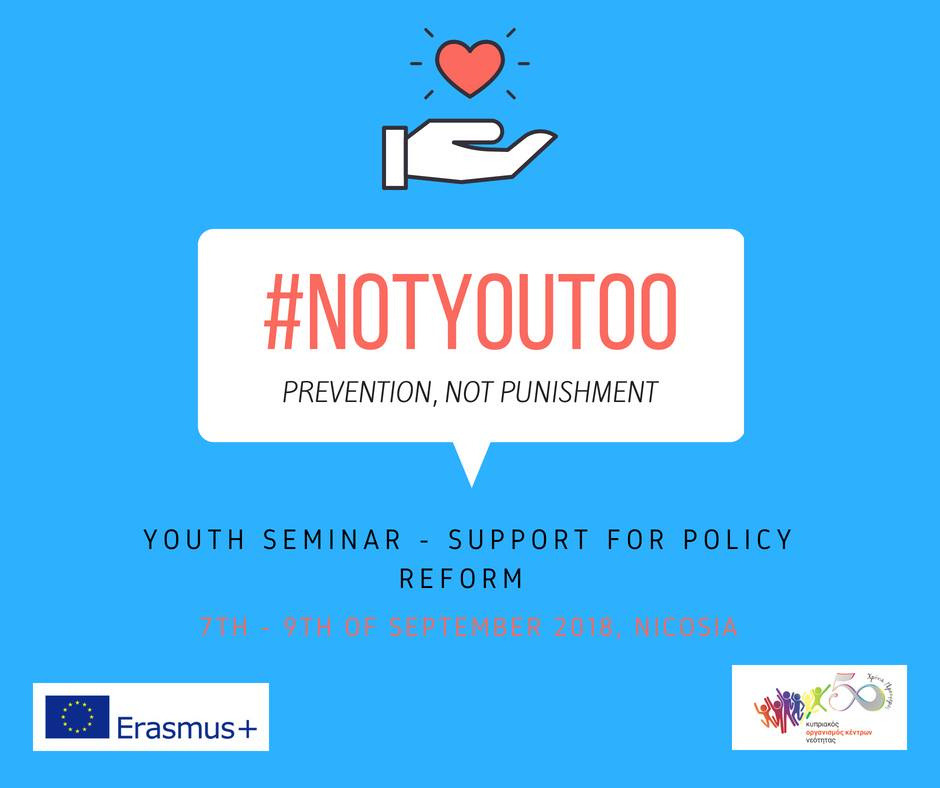Completed Projects
Sexual Harrassment - #NotYouToo

#NOTYOUTOO by Chris Theodorou
prevention, not punishment
The Erasmus+ programme aims towards youth empowerment and urges youth to be active, involved and informed in social development and policymaking.
Cyprus faces several social issues that need to be addressed by the civil society in order to push relevant and important policies protecting human rights.
ECYC (Cyprus Youth Clubs Organization) – KOKEN developed and realized a 3-day seminar based on structured dialogue on the critical topic of sexual harassment.
Speakers, from a variety of influential authority in society, were invited to present their own civil, political actions and information in regards to the topic. Among representatives of the Gender Equality Committee in Employment and Vocational Training, Mass Media reporters, Sociology of Sport, Lawyers and the Cyprus Family Planning Association common issues were identified.
Due to the lack of information on the vastness of human rights, work place policies, where to turn to for support and fear of being ridiculed and disregarded, people tend to leave cases of sexual harassment unidentified and unreported.
The law defines sexual harassment as any unwanted, by the recipient, behavior of sexual nature with words or actions and has as its purpose or effect the insult of a person's dignity, especially when it creates an intimidating, hostile or humiliating environment, in employment or occupational/ vocational education or training or in the process of acquiring placement or position.
Sexual harassment can be in the form of the following:
- Verbal
- Comments on your appearance, body or clothes
- Inappropriate comments
- Questions or comments about your sex life
- Suggestions for sexual favores
- Sexual requirements
- Promises or threats related to the terms and conditions of your employment in return or not of sexual favores
- Non-Verbal
- Wicked look or persistent look on your body
- Demonstration of sexual material, such as magazines, posters, photos, etc.
- Messages on mobile phone or email
- Physical
- Physical touch, pinch, kiss, touching inappropriate body parts, caress
- Attempt of sexual assault
What we, as individuals, can do to revolutionize silence and fear is to speak up. We are responsible to inform the person harassing us that their behavior is not going to be tolerated. If the person insists after personal boundaries are set then the incident or repeated action needs to be reported to the appropriate authorities, in the best-case scenario recalling exact actions on specific dates that are identified as sexual harassment. As a society, we need to allow people of any gender to come forward and report their cases without being belittled and shamed.
The seminar came to an end by giving the floor to the participants to share their ideas moving forward and the development of practical ways we can deal with sexual harassment. More importantly, the prevention by spreading information to youth, Social and private enterprises and the government was highlighted as the first step towards change.
For more information and guidance: Gender Equality Committee in Employment and Vocational Training http://www.eif.gov.cy/mlsi/dl/genderequality.nsf/index_en/index_en?OpenDocument

This project has been funded with support from the European Commission (Erasmus + Programme). These publication(s) article(s), video(s) and magazine(s) reflect the views only of the author(s), and the Commission cannot be held responsible for any use which may be made of the information contained therein.

